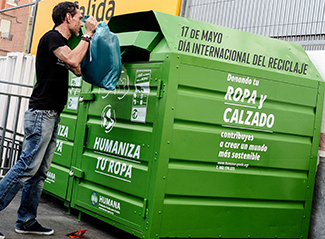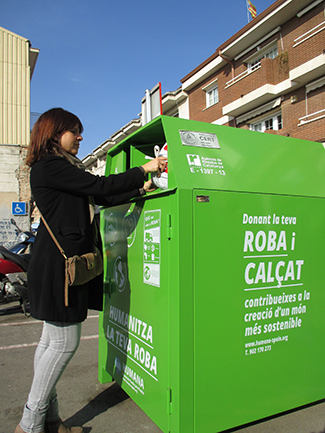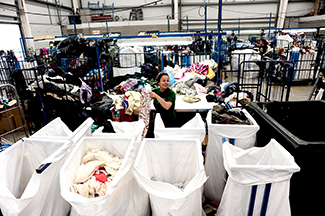consent_cookie
Duración: 1 year
Stores the user's cookie consent state
13-05-2016
Spaniards are increasingly aware of the importance of recycling and reuse, and proper waste management brings a triple benefit: environmental, social and economic, thus promoting global sustainability. Thanks to the cooperation of citizens, increasingly specialized institutions are able to convert waste into resources. All this puts further highlighted coincide with World Recycling Day, held on Tuesday, May 17.
Since this year, Spain has a legislative framework that establishes the necessary measures to move towards the so-called "circular economy": the State Plan of Waste Management Framework (PEMAR) 2016-2022, whose primary objective is to reduce waste disposal ie, that the landfill arrive least possible. How do I get there? Increasing the preparation for reuse and recycling.
Fifth fraction importance
After the organic, packaging and plastics, paper and cardboard, and glass, textile waste is the fifth fraction more disclose, and which has the highest percentage of recovery. However, their level of separate collection could be improved a lot: at present, only two out of five items that we no longer have a second life.
Instead of ending up in a landfill, used clothing is collected by a company specialized in textile recycling and reuse entity to valorize and thereby generate resources. And the textiles we throw away is an asset that, properly managed, becomes the engine of progress in Spain and generating funds for development cooperation in the Southern Hemisphere.
Used clothing as a generator of resources
Management of used clothing is not a recent phenomenon for decades, social institutions have based their resource in such management, either distributing it free of charge to people with few economic resources, either by selling in thrift stores to raise funds for their social projects, to support the most disadvantaged in other countries.
Backed by collaboration agreements with the respective municipalities, these institutions have consolidated their ability to optimize reuse and recycling. The professionalization of the sector has caused some consistory decided out to public tender textile management, which endowed him with greater transparency.
Commodification management
about four years ago, however, some municipalities found that the management of textile could become a source of income (always, that management has been and is free to the public, although the collection and treatment of other waste itself they are subject to a city tax). Therefore, the contests summoned from that time included economic clauses, based on a fixed fee per container or on a per kilo collected. This has meant a decrease in the resources obtained by non-profit organizations for social programs.
Attendance at these competitions companies with little experience in textile recovery but with enough financial muscle, has triggered the financial amounts that competitions set, making this aspect in greater weight, above the technical capacity and social purposes. Abusive commodification of some municipalities is a deception for the citizen, which presupposes a social destination that is donating clothes.
If the mercantilist trend continues, in a few years many of the social entities engaged to manage used clothing will reduce its activity and thus, their ability to support people in difficulty, here or in other countries. Some even disappear and others will see diminished their capacity to generate jobs in Spain.
All this in a context that continues the reduction of funds for development cooperation, which has become little more than a utopia today, and social assistance to problem groups in Spain, and in which resources now marked social accent entities are capable of generating their activity is even more limited.
Despite the difficulties, more than ever, used clothing is and will be an outstanding vehicle for improving the lives of others in less favored countries and provide them with better prospects for their lives through better access to education, clean water , food security; ultimately, a better quality of life and a decent future.
Recycle and reuse, yes, of course. And with a social purpose, all the better.


